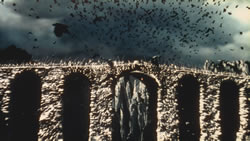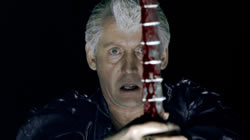
This film has been a long time coming to our cinemas, and like another sci-fi film getting general release here on the same day, it hasn’t been given the usual marketing hype, despite the fact it is Russia’s largest grossing film. But it is a niche market – world cinema with vampires.
Russian cinema has never really made a huge impact on the western world, as in English-speaking countries. Most people have heard of Battleship Potemkin, but very little else has left any lasting mark outside its home territory. Tarkovsky’s original sci-fi classic, Solyaris, and, more recently, Russian Ark, famed for being done in one shot, and the on current release 4 (reviewed on this site). When you consider that IMDB lists over 6000 titles for the Soviet Union and 1600 for post-Soviet Russia, it does make you wonder if we are missing something. The films of Japan, Hong Kong, France and India have all made large impressions outside their own countries, so why not Russia? Most of this can be attributed to US fear of communism, and the ensuing Cold War. Which brings us nicely to the film in question.
If I had to sum up this film in one sentence: it is a cold war between the forces of good and evil. In ancient times the forces of Light (the good guys) and the forces of Dark (the baddies) met on a bridge in pitched battle. Realising that both sides were equally matched and no one could win without everyone being destroyed, the two leaders called a truce. As part of the accord it was agreed that they would keep an eye on each other. The Night Watch were the forces of Light who policed the Dark Others (Others being the vampires, witches, shapeshifters etc that made up the respective forces), while the Day Watch kept an eye on the forces of Light. But as was seen in the Cold War we know of, both sides are desperate to not only catch each other at some nefarious activity, but also cause a major event that they could blame the other for.
The big difference in this stand-off is the spooks aren’t CIA or KGB but creatures of the netherworlds that inhabit this one. From the opening battle scene you know you are in for a visual treat. If nothing else is guaranteed with Russian films, from the ones I’ve seen, the cinematography will be outstanding, and this film did not dispel that perception. Most of it is set at night (the title does give it away) and, apart from the language, it is not obviously set in Russia, it could be any gothic metropolis in the world, real or imagined. This works well in maintaining the suspension of disbelief, and if it had been in English or dubbed, there is very little to distinguish it from a studio movie, at least in terms of production values. On a lot of levels it succeeds where larger budget Hollywood vehicles of a similar ilk have failed (Underworld, Constantine and Blade sequels spring to mind), mainly in the story and presentation.
The story itself is not wildly original, and gives more than a passing nod to Joss Whedon’s Buffyverse, but when was the last time Hollywood produced anything original in this genre, that was a hit? Where it does work is in the presentation of the concepts and underlying myths. Russian literature, and science too for that matter, has always held fascinations for the occult and paranormal. The existence of Others is less of a myth to them than fully stocked supermarkets. The idea that humans have to choose between good or evil, and can’t be coerced into it, does hark back to the religious concept of free will. It is the choice between good and evil, and the responsibility for and consequences of those choices that bookend the film, setting up the rest of the trilogy. The destructive nature of guilt (a sentiment the Catholic church instils strongly in its adherents) is alluded to in one of the film’s climactic scenes.
Being the first part of a projected trilogy, there are themes and characters that are obviously part of a much larger story arc but their relevance to the current chapter is not completely lost, it is just never fully resolved. Some people may find the storytelling slow, or even disjointed, but this should come as no surprise to anyone that has read any Russian literature, and while the film is intended to appeal to as wide an audience as possible it is still imbued with its country’s cultural heritage.
 Although the film does have its fair share of special effects, they do work well within the story and aren’t overtly gratuitous. What fighting there is is fairly brutal, without reliance on eastern martial arts or ballistic weaponry, with the preference for using swords and magic.
Although the film does have its fair share of special effects, they do work well within the story and aren’t overtly gratuitous. What fighting there is is fairly brutal, without reliance on eastern martial arts or ballistic weaponry, with the preference for using swords and magic.
One really nice touch is the use of subtitles that are very cleverly integrated into the film’s look, rather than just as a line of Courier along the bottom of the screen. In fact they don’t distract from what is happening and if anything they make it easier to read and watch at the same time, and you almost forget you are watching a foreign language film.
The film may not be to everyone’s taste but if you like Buffy/Angel, The Matrix or even David Fincher’s films then this will definitely appeal. If you like a gothic film with modern sensibilities then go and see it. It will stay with you a lot longer than a lot of the dross that Hollywood produces in a similar vein.
On general release from October 7
Check out the whole movie in just 2 minutes here (Windows only).
Watch the trailer
